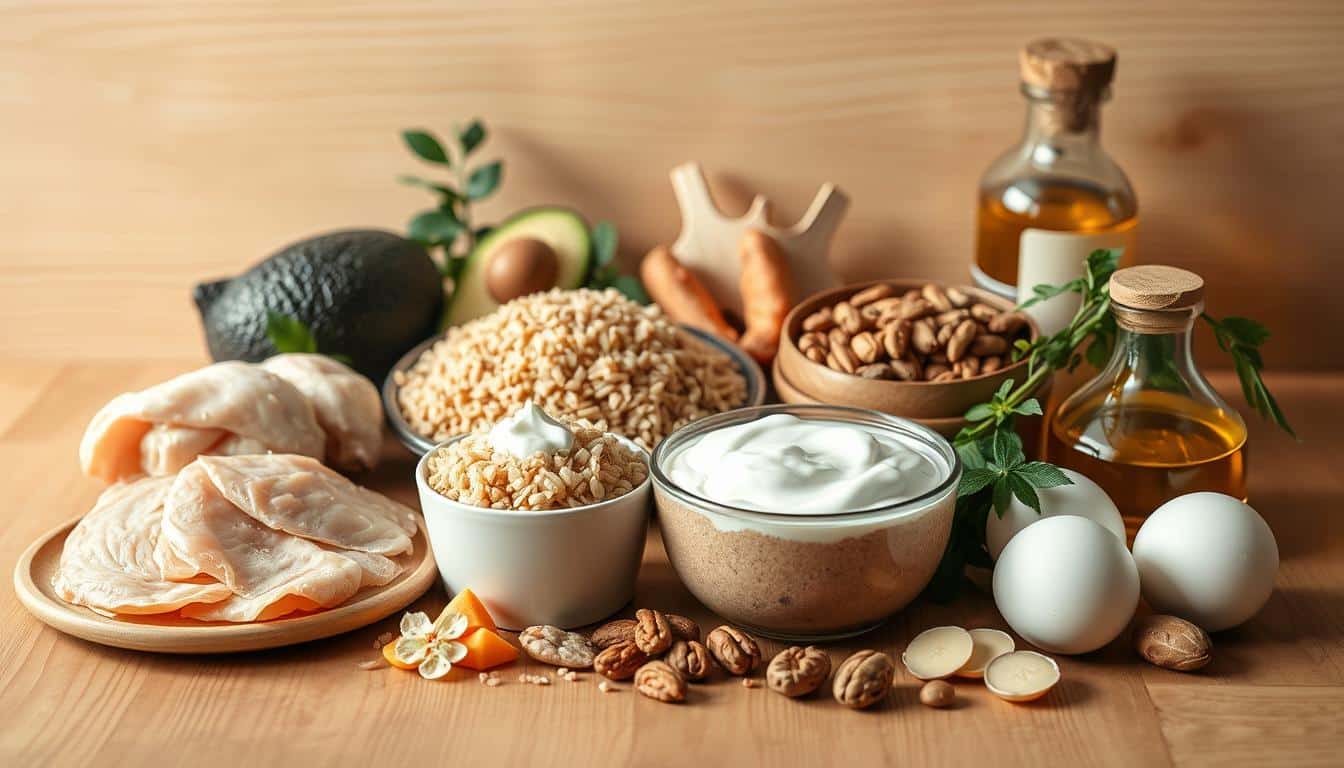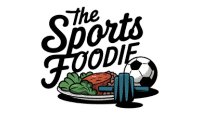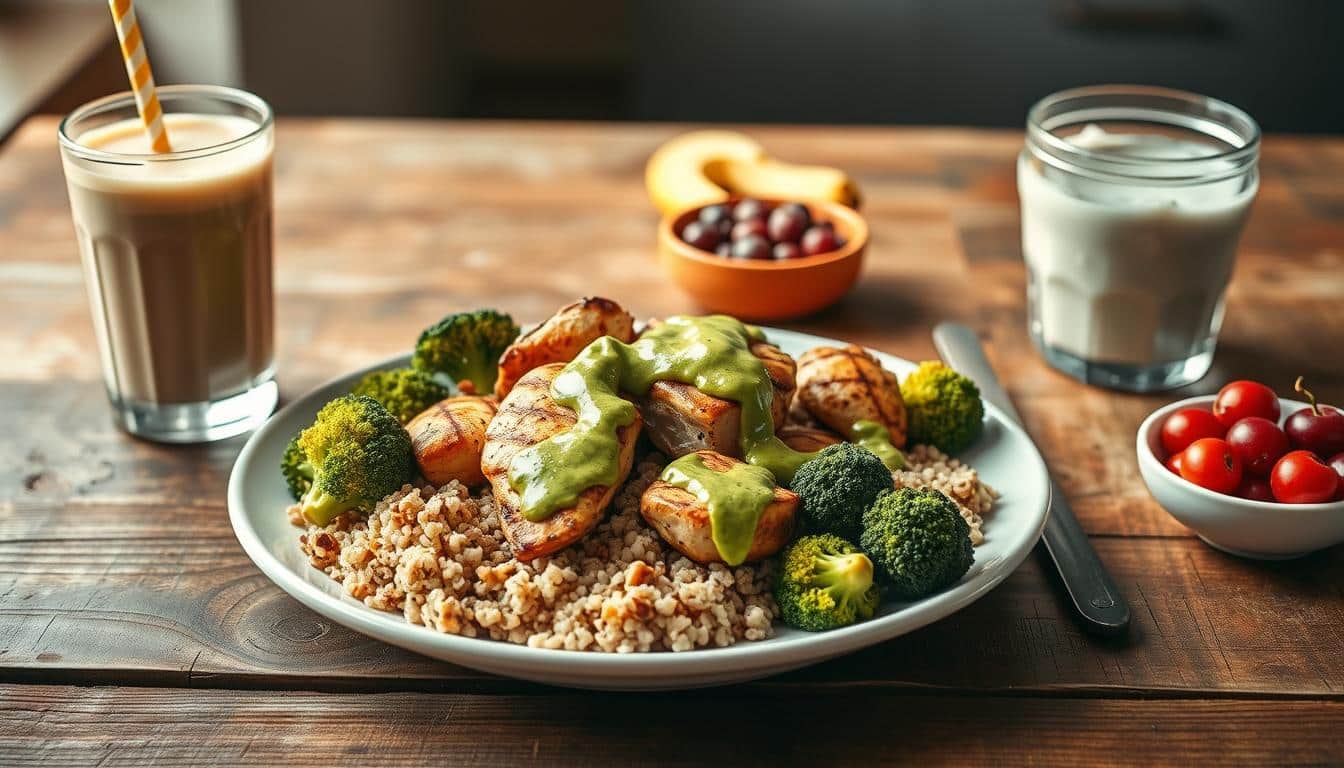You’ve just crushed a tough session at the gym, and now your body’s whispering (or maybe shouting) for the right fuel. What you eat next isn’t just about stopping hunger—it’s the golden hour for muscle repair and growth. Miss this window, and you’re leaving gains on the table.
Science shows your muscles soak up nutrients like a dry sponge after exercise. The right mix of protein and carbs doesn’t just help you recover faster—it kickstarts the process of rebuilding stronger fibers. But with so much conflicting advice out there, how do you know what actually works?
We’ve got your back. Whether you’re rushing home or meal-prepping like a pro, you’ll find options that fit your routine. No complicated recipes or expensive supplements—just real food combinations that deliver results. Let’s cut through the noise and focus on what your body truly needs to transform effort into progress.
Introduction to Post-Workout Nutrition
What you consume after training can make or break your fitness progress. When you push your body during exercise, it uses stored energy and breaks down tissue. This creates an urgent need for specific nutrients to rebuild stronger.

Why Post-Workout Nutrition Matters
Your muscles act like drained batteries after exercise. They’ve burned through glycogen stores (your main energy source) and need immediate refueling. Without proper fuel, recovery slows down—like trying to build a house without bricks.
Research shows eating within 45 minutes boosts muscle protein synthesis by up to 50%. This process repairs micro-tears in muscle fibers, making them thicker and stronger. Skip this window, and you’ll feel it tomorrow—think stiffness and fatigue.
Key Benefits for Muscle Recovery
Smart eating after exercise does three big things:
- Refills energy reserves faster
- Reduces next-day soreness
- Prepares your body for future workouts
Carbs restock glycogen, while proteins provide amino acids for repairs. Together, they create a recovery powerhouse. Your body absorbs nutrients 30% more efficiently in this state—like pouring water on dry soil instead of concrete.
Understanding the Role of Macronutrients
Your post-exercise meal isn’t just about eating—it’s strategic fuel delivery. Think of protein and carbs as construction workers rebuilding a house. One brings the bricks (amino acids), while the other delivers the cement (energy) to lock gains in place.

Protein: Your Repair Toolkit
Every time you lift weights or sprint, tiny tears form in your fibers. Protein steps in like a first responder, providing amino acids to patch these micro-injuries. The International Society of Sports Nutrition suggests 20-40 grams every 3-4 hours to maximize muscle protein synthesis.
Why does this matter? Without enough protein, your body can’t rebuild effectively. It’s like trying to fix a flat tire with duct tape—temporary, not lasting. Quality sources like eggs or Greek yogurt supply all nine essential amino acids for complete recovery.
Carbs: Refueling Your Engine
Ever felt drained after an intense session? That’s your glycogen stores running low. Carbs restock this energy bank, with research recommending 3.6-5.5 grams per pound daily. Pairing them with protein creates a power duo—carbs spike insulin, helping shuttle amino acids into cells faster.
For fast recovery, aim for 0.4 grams of carbs per pound within four hours post-exercise. Combine with 0.1-0.2 grams of protein per pound hourly. Check out these foods that support recovery for practical ideas.
| Timing | Protein (per lb) | Carbs (per lb) | Purpose |
|---|---|---|---|
| Post-Workout (0-4 hrs) | 0.1-0.2g | 0.4g | Jumpstart repair |
| Daily Intake | 0.7-1g | 3.6-5.5g | Sustain energy |
| Every 3-4 hrs | 20-40g total | Varies | Ongoing recovery |
Guide to the Best Post Workout Meals for Muscle Gain
Your gym session ends, but your body’s repair work is just beginning. The right combination of nutrients acts like a construction crew – each element has a specific job in rebuilding stronger tissues and refilling energy tanks.
Synergy Between Fuel Sources
Think of protein as your repair crew and carbs as their energy supply. Research confirms consuming 20 grams of protein triggers maximum muscle repair. Pair it with quick-digesting carbohydrates to create a recovery powerhouse.
Try these simple pairings:
- Grilled chicken with roasted sweet potatoes
- Scrambled eggs mixed with quinoa
- Greek yogurt topped with mixed berries
These combinations deliver amino acids when your body needs them most. The carbs help shuttle nutrients into cells while restocking glycogen. Focus on whole foods you enjoy – consistency matters more than perfection.
Your body processes nutrients fastest within two hours after training. Keep meals simple enough to prepare when you’re tired. A salmon-rice bowl or cottage cheese with pineapple works just as well as complex recipes.
Quick and Simple Post-Workout Meal Ideas
Your post-exercise fuel doesn’t need to be complicated to be effective. The right combinations of lean proteins and smart carbs can power recovery without demanding hours in the kitchen. Let’s explore practical options that fit real-life schedules.
Easy Meals with Lean Proteins and Carbs
These combinations deliver results without fancy ingredients:
| Meal | Protein Source | Carb Source | Prep Time |
|---|---|---|---|
| Power Plate | Grilled chicken (6oz) | Rice + roasted veggies | 15 mins |
| Morning Recovery | 3-egg omelet | Whole grain toast | 8 mins |
| Omega Boost | Salmon fillet | Mashed sweet potato | 20 mins |
| On-the-Go | Tuna salad | Whole grain bread | 5 mins |
Eggs shine here—they pack all nine essential amino acids. Whip up an omelet while your toast browns. For rushed days, blend whey protein with banana and almond milk. It’s liquid nutrition that’s ready before your shower ends.
Prefer minimal cleanup? Try canned salmon mixed with microwave-ready rice. Add frozen veggies heated in the same bowl. These meals prove simple food choices can be powerful recovery tools when timed right.
Timing Your Post-Workout Nutrition
The clock starts ticking after your last rep—but how urgently should you really eat? Let’s clear up the confusion around nutrient timing so you can recover smarter, not harder.
Optimal Eating Windows After Exercise
Forget the old “30-minute rule” you’ve heard about. Studies now show you have up to two hours to consume protein and carbs without missing key benefits. Your muscles remain primed to absorb nutrients longer than previously thought.
Here’s what matters most:
- If you ate a balanced meal 1-2 hours before training, your body’s still using those nutrients
- Focus on eating within 3-4 hours post-exercise for sustained recovery
- Consistency beats perfect timing—regular fueling matters more than single meals
Early research suggested immediate refueling was crucial. New findings reveal your system processes nutrients effectively for several hours. The ISSN recommends prioritizing quality over stopwatch precision.
Can’t eat right after training? No panic needed. Grab a snack within two hours, then have a proper meal when possible. Your body’s smarter than you think—it’ll use what you provide when you provide it.
Incorporating Whey Protein and Other Supplements
Supplements can be your shortcut when whole foods aren’t handy. While real meals should form your foundation, strategic additions help fill gaps in busy schedules. Let’s explore how to use these tools without overcomplicating things.
Why Whey Works When Time’s Tight
Whey protein acts like a turbocharger for recovery. Your system absorbs it 80% faster than chicken or eggs, delivering amino acids when tissues need them most. Studies show this speed matters—subjects using whey saw 22% better muscle repair compared to slower-digesting proteins.
Mix a scoop with water after training for instant fuel. Prefer creamier shakes? Blend with whole milk. Research reveals full-fat dairy boosts growth hormones better than skim versions. It’s why whole eggs outperform egg whites alone—the yolk’s nutrients amplify protein use.
Beyond the Shaker Bottle
Not a dairy fan? Try these alternatives:
| Option | Protein per Serving | Key Benefit |
|---|---|---|
| Pea Protein | 25g | Easy digestion |
| Hemp Seeds | 10g | Omega-3 boost |
| Greek Yogurt | 17g | Natural probiotics |
| Pumpkin Seeds | 9g | Magnesium source |
Your body cares more about consistent protein intake than perfect sources. A 2021 review found no difference in muscle growth between supplement users and whole-food eaters getting equal grams. Choose options that fit your lifestyle—what matters is showing up daily with quality fuel.
Real-World Meal Examples and Recipes
Let’s cut to what matters—simple, no-fuss fuel that fits real life. Whether you’re rushing to work or need something portable, these options keep recovery on track without chef-level skills.
Everyday Training Fuel
After resistance sessions, your body craves protein and carbs. Try these combos:
| Meal | Protein | Carbs | Prep Time |
|---|---|---|---|
| Rice Bowl | 5oz chicken | 1 cup jasmine rice | 12 mins |
| Power Mix | 1 cup Greek yogurt | ½ cup oats + berries | 2 mins |
| Salmon Pack | 6oz fillet | Microwave quinoa | 15 mins |
Pre-make rice bowls for grab-and-go convenience. Pair with steamed veggies for extra nutrients. Not hungry post-session? Blend a banana with whey protein—it’s liquid gold for glycogen refills.
Snacks That Work Hard
When time’s tight, these keep recovery rolling:
- Tuna + whole grain crackers (18g protein)
- Cottage cheese + pineapple chunks (14g protein)
- Peanut butter on rice cakes + apple slices
Keep snacks in your gym bag or desk drawer. Starting your day with high-energy breakfast foods sets the stage for better recovery later. Remember—consistency beats perfection every time.
Conclusion
Your dedication in the gym deserves smart nutrition choices afterward. What you eat plays a crucial role in converting effort into visible results. Combining quality protein sources with energizing carbs helps maximize muscle protein synthesis, turning sweat sessions into lasting strength.
The International Society of Sports Nutrition confirms proper ratios matter most. Aim for 20-40 grams of protein paired with fast-acting carbs within two hours post-session. This combo repairs tissues faster and preps your system for tomorrow’s challenges.
Remember these essentials:
• Prioritize whole foods you enjoy – consistency beats perfection
• Adjust portions based on workout intensity and personal fitness goals
• Hydration enhances nutrient absorption – don’t forget water
Your body’s ability to rebuild peaks when you fuel it thoughtfully. With each smart meal choice, you’re not just recovering – you’re laying bricks for long-term growth. Keep it simple, stay consistent, and watch your hard work pay off.


